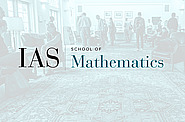2004-2005 seminars
Jan
17
2005
Computer Science/Discrete Mathematics Seminar I
Multicommodity flow, well-linked terminals, and routing problems
Chandra Chekuri
11:15am|S-101
Dec
14
2004
Computer Science/Discrete Mathematics Seminar II
Variance/Entropy Decomposition Techniques for Proving Fast Mixing of the Glauber Dynamics
10:30am|S-101
Dec
13
2004
Computer Science/Discrete Mathematics Seminar I
On Learning Random Decision Trees and DNF Formulas
Rocco Servedio
11:15am|S-101
Dec
07
2004
Computer Science/Discrete Mathematics Seminar II
Variance/Entropy Decomposition Techniques for Proving Fast Mixing of the Glauber Dynamics
10:30am|S-101
Dec
06
2004
Computer Science/Discrete Mathematics Seminar I
Several Geometric Applications of Chernoff Estimates: A Zigzag Approximation for Balls and Some Random Matrices
Shiri Artstein
11:15am|S-101
Nov
30
2004
Computer Science/Discrete Mathematics Seminar II
On Random Bernoulli Matrices: Singularity and Determinant
10:30am|S-101
Nov
29
2004
Computer Science/Discrete Mathematics Seminar I
An Unconditional Study of Computational Zero Knowledge
11:15am|S-101
Nov
23
2004
Computer Science/Discrete Mathematics Seminar II
Learnability and Automatizability
Michael Alekhnovich
10:30am|S-101
Nov
22
2004
Computer Science/Discrete Mathematics Seminar I
Using Nondeterminism to Amplify Hardness
11:15am|S-101
Nov
16
2004
Computer Science/Discrete Mathematics Seminar II
Slow Mixing of Local Dynamics for Colourings and Independent Sets
David Galvin
10:30am|S-101
